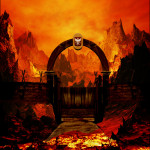This is taken from an old post of mine. I still find it a real defeater for the concept of hell.

Chris Whiteside
I have just listened to Ray Bradley debate William Lane Craig. I heard this several years ago but didn’t really pay it close attention. This time round I was quite shocked at how many points Craig evaded, or logical demands from Bradley that he met with the terms “God may” and so on.
Craig squirmed big time when Bradley pressed him on subsets of compossibles. This is a REALLY important point. I will try to set it out here:
Imagine a set of people, call that set A. These are all the people in this world – W1. These people are made up of people who will freely come to love God, and end up in heaven – call these Subset X, and those who reject God, and end up in hell – call these Subset Y. God knows this free decision in advance (ignore all of the issues with this).
What Bradley says, I think, is why doesn’t God just forget about Y, and just make a world of only people in Subset X (Call it world W2). This means God would not be cruelly creating a whole (majority) set of people who will end up being eternally punished in hell. Him knowing of the hellish torment of Subset Y in advance begs the questions of how a loving God could produce those people anyway.
So why does God simply not create people who he knows would freely love him in this world such as world W2, but only make them and no one else? This would produce a universalist world but one which is not straight-jacketed since God would know that in a world such as this, they would still freely choose him.
Craig attempts to tackle this by saying a possible. He claims it COULD be that in this new world, that same subset might have different situations whereby they now wouldn’t freely love God. He claims that God might not feasibly be able to create this second world. In other words, W2 creates a different situation than W1 whereby, now, all of Subset X wouldn’t freely choose God. Rather weak defence for an omnipotent and omniscient God, no? So a few of this Subset X might not come to God in this new world W2. So don’t create these ones, but only the ones in X who would freely love God. It might end up being a small subset, but better that than a huge amount of people condemned to eternal torment.
God, in all his infinite wisdom must be able to create a world where he knows that all the people in it would freely come to love him. He might know this from the world W2, but also from knowing the counterfactuals of worlds W1, W3 etc. He could surely contrive a world where all the people came to love him, and he could see that these same people would be the sort of people who would love him in other worlds too.
Craig failed to address this, and I think was either being wilfully dense or disingenuous.
As Craig would say, how do you know the final set of individuals in the “small subset” isn’t the empty set? In other words, Craig claims that given W2, which now has only the free-lovers from W1, there is a different environment, if you will, from W1. As such, maybe some of those form W1 who would have loved God now find themselves in a different situation (W2) and would no longer love God. So now God takes that now dwindled set from W2 that would love him freely and puts them in W3. But now some of those would not freely love him here… and so on, until there is a regression to no world where all the people would freely love God.
THE ONLY reason one could even remotely posit such an unlikely occurrence that the greatest conceivable being couldn’t and wouldn’t be able to produce such a world is because to allow him to do so would violate some of the theist’s cherished beliefs.
But in the one breath to claim the validity of the ontological argument and to suppose into existence the greatest conceivable being, one HAS to admit that a being who cannot do this would be inferior to an entity who could. And thus by the same logic of the ontological argument, adhered to by Plantinga and Craig, such a being would exist.
In other words, the greatest conceivable being would be able to create such a world where everyone would freely love him. If he can’t, then I would be able to conceive of a greater being than the God that exists. This would violate the ontological argument.
Craig tries to get away, it seems, with claiming that it must be that it is unfeasible for God to do this as set out above. However, to allow an omniGod this ‘weakness’, it must fall under the auspices of being logically impossible. However, it is not deductively logically impossible as far as I can tell. It seems only inductively so, and surely the greatest conceivable being could overcome this.
This is not only an argument against hell, but against God creating this world. Ergo, against God.
